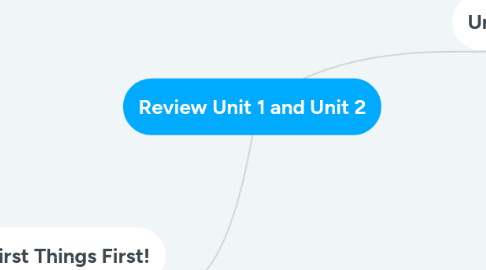
1. Unit 1: Life on the Edge
1.1. Extreme weather
1.1.1. high winds
1.1.2. blizzard
1.1.3. hail
1.1.4. heavy rain
1.1.5. thunder and lightning
1.1.6. fog
1.2. Simple present and present continuous review
1.2.1. Use the simple present to describe what normally happens. This includes routines and facts.
1.3. Simple past and past continuous review
1.3.1. Use the simple past to describe actions and events in the past.
1.3.1.1. They didn’t had to stop for food.
1.3.2. Use the past continuous to describe actions and events in progress in the past.
1.3.2.1. He wasn’t wearing a helmet when he fell.
1.4. Useful language
1.4.1. you agree
1.4.2. See what I
1.4.3. disagree
1.4.4. think
1.5. Used to
1.5.1. Use used to when something happened over a period of time but doesn’t happen anymore.
1.5.1.1. I used to be a swimmer, but now I play soccer.
1.5.1.2. We didn’t use toride our bikes a lot, but now we ride every day.
1.6. How you write an email
1.6.1. Begin with a greeting. Always open your email with a greeting
1.6.2. Thank the recipient. If you are replying to a client's inquiry, you should begin with a line of thanks
1.6.3. State your purpose
1.6.4. Add your closing remarks
2. Unit 2: First Things First!
2.1. Time for bed
2.1.1. Teenagers have to get more sleep! According to researchers, tteenagers need to sleep a lot more than adults: eight to 10 hours every night. Sadly, only 15 percent of teenagers sleep eight hours on a school night, and that’s just not enough.
2.1.2. Your body is still growing, and your brain is still developing. Teenagers shouldn’t forget how much their bodies need that extra sleep.
2.1.3. Without enough sleep, your body gets weak, and it’s easy for you to catch colds and other illnesses. Tired people often eat food with more sugar in it, and that isn’t good for you.
2.2. have to/don’t have to
2.2.1. Use have/has to say that it is necessary to do something.
2.2.1.1. I have to get more sleep.
2.2.2. Use don’t/doesn’t have to to say that it is not necessary to do something, but you can do it if you want to.
2.2.2.1. My little sister doesn’t have to help with the house work. She’s only two.
2.3. must/must not
2.3.1. Use must/must not to talk about rules, laws, or prohibited actions.
2.3.1.1. You must be quiet in the librar y.
2.3.1.2. He must not use his cell phone here.
2.4. Stressed Out!
2.4.1. Make a schedule and keep to it.
2.4.2. Breathe deeply and try to relax.
2.4.3. Talk to someone.
2.5. Emotions
2.5.1. embarrassed
2.5.2. awful
2.5.3. proud
2.5.4. terrified
2.5.5. stressed out
2.5.6. exhausted
2.5.7. wonderful
2.6. Modals of obligation – should, ought to, had better
2.6.1. Should,ought to, and had better have similar meanings. Use them to say what is a good or right thing to do
2.6.1.1. Use should and shouldn’tfor a personal opinion
2.6.1.1.1. You should try to work out more.
2.6.1.1.2. He shouldn’t get so stressed out.
2.6.1.2. Use ought to and ought not to when you’re talking about duty or the law
2.6.1.2.1. You ought nottoenterthat part of the airport.
2.6.1.2.2. I ought to call the police about the car accident.
2.6.1.3. Use had better and had better not to give very strong advice.
2.6.1.3.1. You had better startstudying for your test now.
2.7. Useful language
2.7.1. Let me show you.
2.7.2. I’m not very good at things like that.
2.7.3. I’m not sure how to do it.
2.7.4. t’s really pretty simple.
2.7.5. I’ll give you a hand if you like.
2.8. Priorities
2.8.1. staying out late on the weekend
2.8.2. chatting with friends online
2.8.3. helping around the house
2.8.4. having time for yourself
